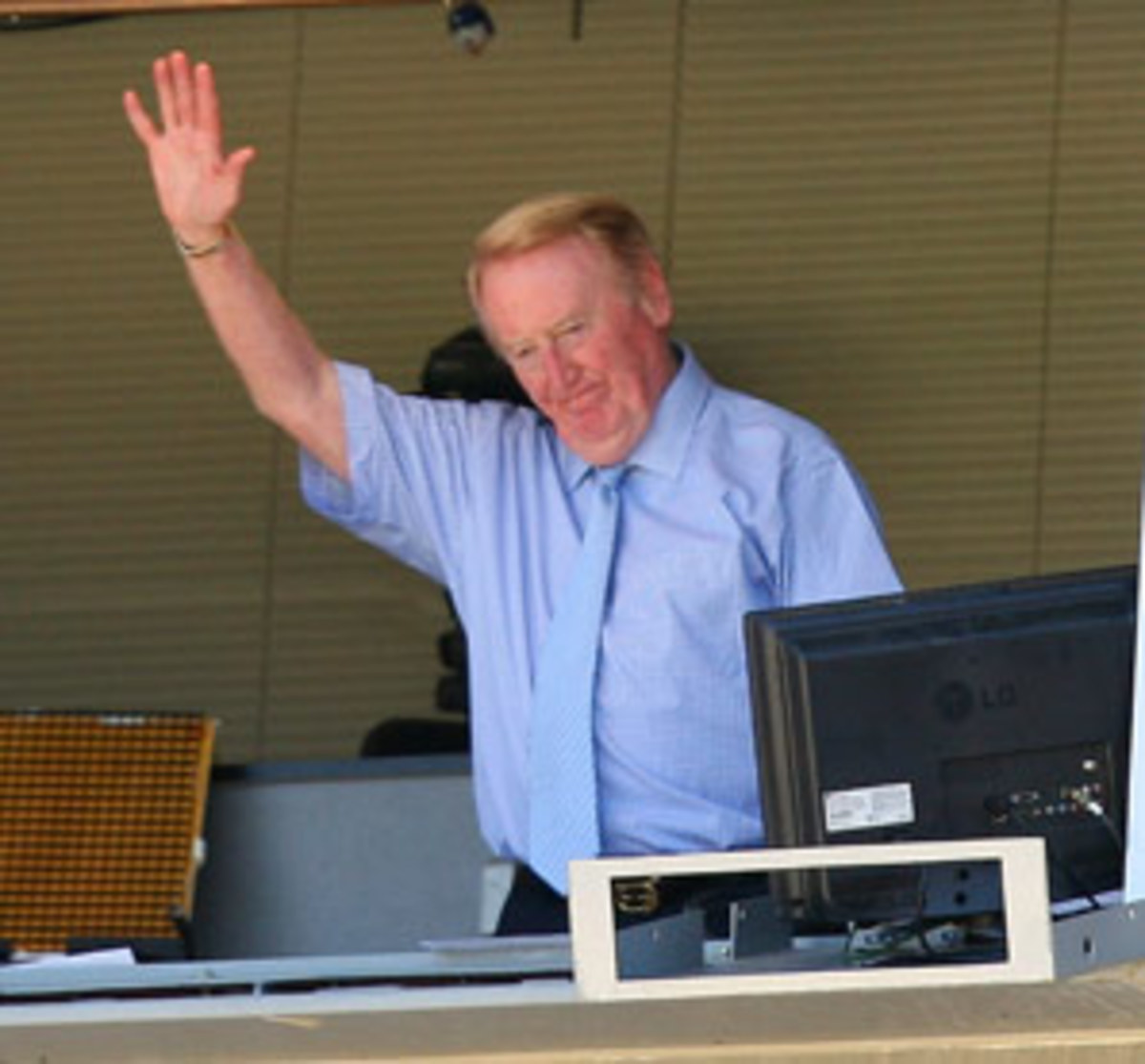At 84, Vin Scully still a magical voice emanating through the night


I hear voices late at night. Or rather a voice, working solo, issuing from California, channeled through my laptop and conveyed across the continent via MLB.TV, which lets me watch Los Angeles Dodger games in the dark, in Connecticut, so that the last voice I hear before slipping out of consciousness is Vin Scully's.
If it's the last voice I ever hear I'll die happy, the voice of baseball calling my demise -- "And that'll do it folks" -- before reading out the line score of my life.
One afternoon not long ago, in a rare matinee, I turned on the Dodgers home opener only to discover that Scully was home sick with a terrible cold. It was like phoning Dial-a-Prayer and getting God's voicemail -- like taking that last step up the stairs only to find it isn't there. Something so familiar, suddenly missing: It was disorienting.
What I heard was: "Standing in for Laurence Olivier in the role of Hamlet this afternoon is his understudy ..." Then I turned the game off and went outside.
Two nights earlier, I had stayed up late listening to Scully call the Dodger game in San Diego, my head squeezed into headphones, as his so often have been. On big occasions, like Hank Aaron's 715th home run trot, Scully would take his headset off in the booth and walk away for a moment, removing the temptation to talk over the pictures, recognizing that part of the music is the silence between the notes.
But his silence at the Dodgers' home opener was entirely different, and entirely unwelcome. It was something like the opposite of music, like putting on the White Album to discover John and Paul had the day off. It was only the second Dodgers opener Scully had missed in 63 seasons, and the first in 35 years. The announcement of his name drew a great ovation, and much concern. And while much of that concern was for him -- Matt Kemp on Twitter: "Get well soon Mr. Vin Scully!!" -- much of it was for the rest of us, wrong-footed by his sudden absence.
Thirty-six hours earlier, on a Saturday night in San Diego, Scully had said of Padre relief pitcher Luke Gregerson: "How did he get to the ballpark tonight? Did he walk, or take a cab? He skateboarded. [Pause, pitch.] As Roy Campanella said, 'You gotta have a lot of little boy in you ...' "
At 84, Scully has a Lotta Little Boy, delighted in the middle innings to introduce every Padre as a real person, humanized by a hometown. And so we get Gregerson, "growing up in Park Ridge, Illinois ..." And Anthony Bass, "out of Dearborn, Michigan ..." Huston Street, a Huston from Austin, was not even the most famous Street in the family: His father, James -- pause, pitch -- quarterbacked the Texas Longhorns to victory in the 1970 Cotton Bowl, locking up the national championship.
There was a short, speculative jazz riff on how Yonder Alonso -- born in Cuba, raised in Miami -- acquired his unusual first name. Vincent Edward Scully (out of the Bronx, by way of Washington Heights) was writing a Russian novel in every inning of baseball, and if the author was suffering -- and he was: Scully never fell asleep in his hotel afterward -- the reader never knew it. He worked the final game of the series on Sunday, the Dodgers were off on Monday, and Scully was conspicuously absent from the opener on Tuesday.
Mercifully -- and reflexively, without even noticing at first -- I'd begun to write down musical phrases of Scully's during the San Diego series. Reading them might seem pointless, like reading the lyric sheet in lieu of listening to a song. But if the song is familiar enough, you hear the music in your head. The 2012 Dodgers are not an especially euphonious group of names, but Scully hits every grace note in "Clayton Kershaw" and "Andre Ethier." Still, to paraphrase Matt Kemp: Get well soon Mr. Rubby de la Rosa! I want to hear Vin call your name this season.
These notes sustained me for the week of Scully's convalescence -- and of mine. Scully has recovered now (he returned for the final game of the Dodgers' opening home stand) but I have not, for the team is in Milwaukee, and the only road games Scully works are those in California and Arizona. Like certain other rare flowers, he will not be found east of the Rockies, and for the best and oldest of reasons: He misses home. As a result, residents of the East Coast almost only ever hear him after dark, as a voice in the night, emanating from the ether.
He has been calling these games since 1950, when TV exploded, and America, in that single year, went from three million sets to nearly 10 million. Sixty-three years later, from 2,500 miles away, during another technological revolution, I'm listening to the same voice over an iPad. Its glowing screen provides the only light in the room, so that I resemble a kid under the covers with a flashlight -- and a radio and a homemade scorecard -- waiting the next verse in the Book of Vin.
